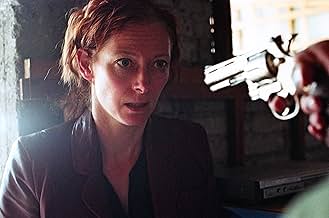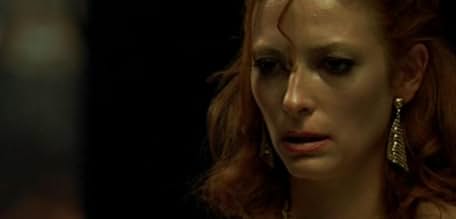Julia
- 2008
- Tous publics
- 2h 24min
NOTE IMDb
7,0/10
7,1 k
MA NOTE
Ajouter une intrigue dans votre langueA woman tries to extort money, using a young boy as bait.A woman tries to extort money, using a young boy as bait.A woman tries to extort money, using a young boy as bait.
- Réalisation
- Scénario
- Casting principal
- Récompenses
- 7 victoires et 8 nominations au total
Gaston Peterson
- Miguel
- (as Gastón Peterson)
M.J. Karmi
- AA Woman
- (as MJ Karmi)
Carl Dillard
- Henry AA
- (as Carl Dudley Dillard)
Avis à la une
JULIA is one of those films that goes beyond being a story and production worth the viewers' attention: this is one of those experiences in observing the art of acting at its peak. Tilda Swinton who continues to explore roles that challenge her and her audience, roles that few other actresses would considering making let alone making, and in JULIA she covers a range of emotions and mutations of a character that simply leave the audience in complete awe of her talent. She is extraordinary!
Julia is a bright but flawed person. She is an alcoholic who spends her nights drinking herself into oblivion only to wake up the next morning not recognizing her bed partner or the surroundings of her comatosed night of stupor. Swinton makes us understand this character's 'way with men' in her grossly revealing clothes and her flirtations backed by a mouth of filth. Julia loses her job over her drunken tardiness and has ruined a 'relationship' with ex-alcoholic Mitch (Saul Rubinek) and finally goes to an AA meeting where she meets Elena (Kate Del Castillo), a pathetic recovering alcoholic whose only goal in life is to retrieve her son Tom (Aidan Gould) from his wealthy disapproving grandfather. Julia is so desperate for money that she buys into a bizarre 'kidnapping' of Tom for Elena, a decision that triggers all of the rest of the film's journey through crime and sleaze as Julia fails at every effort to 'play the game' of criminal to make a fortune. Traveling from Los Angeles through the desert to Mexico, along the way Julia encounters 'co-facilitators' in her new life of crime - portrayed by such fine actors as Bruno Bichir (Demian Bichir's brother), a new and fine young actor Horacio Garcia Rojas, and Eugene Byrd to name only a few of the standout performances. Though a bit overlong at 2 1/2 hours, the script by Michael Collins and Camille Natta is spot on perfect and the direction by Erick Zonca makes the long film always richly colored and fascinating in attention to detail.
But the real reason to watch this film in the astonishing, multifaceted performance by Tilda Swinton, surely one of the finest actresses before us today. Her Julia creates a new level of acting standard- even for Swinton!
Grady Harp
Julia is a bright but flawed person. She is an alcoholic who spends her nights drinking herself into oblivion only to wake up the next morning not recognizing her bed partner or the surroundings of her comatosed night of stupor. Swinton makes us understand this character's 'way with men' in her grossly revealing clothes and her flirtations backed by a mouth of filth. Julia loses her job over her drunken tardiness and has ruined a 'relationship' with ex-alcoholic Mitch (Saul Rubinek) and finally goes to an AA meeting where she meets Elena (Kate Del Castillo), a pathetic recovering alcoholic whose only goal in life is to retrieve her son Tom (Aidan Gould) from his wealthy disapproving grandfather. Julia is so desperate for money that she buys into a bizarre 'kidnapping' of Tom for Elena, a decision that triggers all of the rest of the film's journey through crime and sleaze as Julia fails at every effort to 'play the game' of criminal to make a fortune. Traveling from Los Angeles through the desert to Mexico, along the way Julia encounters 'co-facilitators' in her new life of crime - portrayed by such fine actors as Bruno Bichir (Demian Bichir's brother), a new and fine young actor Horacio Garcia Rojas, and Eugene Byrd to name only a few of the standout performances. Though a bit overlong at 2 1/2 hours, the script by Michael Collins and Camille Natta is spot on perfect and the direction by Erick Zonca makes the long film always richly colored and fascinating in attention to detail.
But the real reason to watch this film in the astonishing, multifaceted performance by Tilda Swinton, surely one of the finest actresses before us today. Her Julia creates a new level of acting standard- even for Swinton!
Grady Harp
Julia is a lot of things. It's one of the craziest movies I've ever seen, and Tilda Swinton gives the best performance of her career. A one-of-kind thriller that's entertaining as hell, thrilling, hilarious and devilishly twisted.
Julia (2008)
A hard edged tale of a woman pushed by her own desperation into crimes over her head. Tilda Swinton lets it rip here, in a vivid, color, cinema-verite style that depends as much on making you uneasy as anything. The characters are so believable, and the sequence of events stumbles along with such perfect inelegance (to say the least), you hate to see it all because what happens is pretty awful.
The ground covered is a believable version of what an ordinary person with seemingly good moral structure is driven to by circumstance. In this case, it's about being pushed by her own sorry life to do something that breaks out of it. But it also begins as a curious compassion, a genuine skepticism overwhelmed by the possibilities. By thinking, why not? And of course, why not then becomes all too clear. It's this sense that it could by a stretch happen to you or me (hopefully not, but in theory) that gives the movie its chilling penetration.
And the ending, as sensational as it gets, is a logical outcome of where we began, and there is a kind of victory, but it's no Hollywood ending, and that's a huge relief. Rather, it's as if you went along with a woman for the adventure of her life and it's the real thing, nothing held back, including disbelief, fear, violence, and sometimes, thankfully, a glimmer of hope. Very very well made--acting, writing, filming--but not everyone's cup of tea because it is so unsettling.
A hard edged tale of a woman pushed by her own desperation into crimes over her head. Tilda Swinton lets it rip here, in a vivid, color, cinema-verite style that depends as much on making you uneasy as anything. The characters are so believable, and the sequence of events stumbles along with such perfect inelegance (to say the least), you hate to see it all because what happens is pretty awful.
The ground covered is a believable version of what an ordinary person with seemingly good moral structure is driven to by circumstance. In this case, it's about being pushed by her own sorry life to do something that breaks out of it. But it also begins as a curious compassion, a genuine skepticism overwhelmed by the possibilities. By thinking, why not? And of course, why not then becomes all too clear. It's this sense that it could by a stretch happen to you or me (hopefully not, but in theory) that gives the movie its chilling penetration.
And the ending, as sensational as it gets, is a logical outcome of where we began, and there is a kind of victory, but it's no Hollywood ending, and that's a huge relief. Rather, it's as if you went along with a woman for the adventure of her life and it's the real thing, nothing held back, including disbelief, fear, violence, and sometimes, thankfully, a glimmer of hope. Very very well made--acting, writing, filming--but not everyone's cup of tea because it is so unsettling.
Lately, I have become a big fan of Tilda Swinton. It started off with her villain stand-out role in The Chronicles of Narnia, then I saw her alongside George Clooney in Michael Clayton, where she stole her scenes. Recently, I saw her in her best work yet, We Need To Talk About Kevin, so it was just a matter of time before I saw Julia, and it's plot interested me.
Julia is a pretty straight-forward crime thriller. It has a lot of twists and turns, and it always remains entertaining and intriguing. You want to know what's going to happen to Swinton's character and the boy she is taking for ransom. Julia becomes more and more likable as the film progresses and we stop seeing her as a villain. Swinton does a magnificent job too. I have never seen her play a role like this before, and it's without a doubt her showiest performance, since Julia is the showiest role. Credit has to be given to the way she so casually makes Julia someone we actually root for as the film goes on. Not many actors would have been able to do this, but she does it gracefully, and she gets better as the film goes along because instead of just a cartoon that we first saw in the beginning, we see a woman with fears and real feelings as well.
Now, the film isn't perfect... far from it. It feels sort of disjointed. Like I said, Swinton easily slips into another persona, but without any help from the script. Many films make it really believable the way a character slips into different attitudes, but this film doesn't really. Swinton does sort of transition it, but behind her incredible performance, you can easily see that the script expects us to believe the way this character starts acting differently. Too fast, without any real depth and not subtle, or even fitting to the film. Still, t's plausible barely just because of Swinton.
The problems still keep arising though, especially when we enter Mexico. I never really have a problem with the way Mexicans are portrayed, since I don't take offense easily, but this rubbed me the wrong way. Their manner of speaking, their actual language. I'm not saying it's completely off the mark, but something about that storyline upset me. Maybe it has to do with the thin characterization, or the execution, or the direction. All I know is that what only kept me watching was finding out all of Julia's story. I am also not one to dismiss endings because they aren't "complete", but here it didn't work well. I wanted it to finish, for it to reveal the fate of this character. This sort of abrupt ending only works specifically for certain powerful films, and since this isn't, it just left me unsatisfied.
Overall, worth a watch for Swinton's magnificent performance, and I was actually more entertained than my rating will suggest, but the film is full of flaws within its story. A Breaking Bad story not nearly as engaging or as complicated as it wishes, but still not bad at all and remains a solid film. This feels like the performance Swinton won the Oscar for, just because of how extreme it is.
Julia is a pretty straight-forward crime thriller. It has a lot of twists and turns, and it always remains entertaining and intriguing. You want to know what's going to happen to Swinton's character and the boy she is taking for ransom. Julia becomes more and more likable as the film progresses and we stop seeing her as a villain. Swinton does a magnificent job too. I have never seen her play a role like this before, and it's without a doubt her showiest performance, since Julia is the showiest role. Credit has to be given to the way she so casually makes Julia someone we actually root for as the film goes on. Not many actors would have been able to do this, but she does it gracefully, and she gets better as the film goes along because instead of just a cartoon that we first saw in the beginning, we see a woman with fears and real feelings as well.
Now, the film isn't perfect... far from it. It feels sort of disjointed. Like I said, Swinton easily slips into another persona, but without any help from the script. Many films make it really believable the way a character slips into different attitudes, but this film doesn't really. Swinton does sort of transition it, but behind her incredible performance, you can easily see that the script expects us to believe the way this character starts acting differently. Too fast, without any real depth and not subtle, or even fitting to the film. Still, t's plausible barely just because of Swinton.
The problems still keep arising though, especially when we enter Mexico. I never really have a problem with the way Mexicans are portrayed, since I don't take offense easily, but this rubbed me the wrong way. Their manner of speaking, their actual language. I'm not saying it's completely off the mark, but something about that storyline upset me. Maybe it has to do with the thin characterization, or the execution, or the direction. All I know is that what only kept me watching was finding out all of Julia's story. I am also not one to dismiss endings because they aren't "complete", but here it didn't work well. I wanted it to finish, for it to reveal the fate of this character. This sort of abrupt ending only works specifically for certain powerful films, and since this isn't, it just left me unsatisfied.
Overall, worth a watch for Swinton's magnificent performance, and I was actually more entertained than my rating will suggest, but the film is full of flaws within its story. A Breaking Bad story not nearly as engaging or as complicated as it wishes, but still not bad at all and remains a solid film. This feels like the performance Swinton won the Oscar for, just because of how extreme it is.
Eric Zonca directed the sublime 'The Dream Life of Angels', a beautiful story of female friendship and existential despair. 'Julia', his first film for 9 years, is equally powerful, but much less charming. Tilda Swinton is great as Julia, but her character is absolutely unlikeable; the plot, meanwhile, though harrowing, in places strains credibility, especially in its portrait of Mexico as a literal hell on earth. Yet Zonca's talent is also on display, and the story commands your attention in spite of its unpleasantness. The ending is ambiguous, potentially interpretable as redemptive, but not clearly so. I'm not sure this is a great film; I am sure I want to see more from this director.
Le saviez-vous
- AnecdotesIn real life, Tilda Swinton, who plays an alcoholic in the film, cannot drink. She says she would fall asleep after having just one glass.
- GaffesThe motel scenes in which Julia holds Tom captive that are supposed to be set in California have non-American electrical outlets, revealing the scenes' Mexican location.
- ConnexionsReferenced in Teen Wolf: The Tell (2011)
- Bandes originalesTrain Station
Composed by Darius Keeler and Pollard Berries
Meilleurs choix
Connectez-vous pour évaluer et suivre la liste de favoris afin de recevoir des recommandations personnalisées
- How long is Julia?Alimenté par Alexa
Détails
Box-office
- Budget
- 6 000 000 $US (estimé)
- Montant brut aux États-Unis et au Canada
- 65 108 $US
- Week-end de sortie aux États-Unis et au Canada
- 12 524 $US
- 10 mai 2009
- Montant brut mondial
- 1 333 241 $US
- Durée2 heures 24 minutes
- Couleur
- Mixage
- Rapport de forme
- 2.35 : 1
Contribuer à cette page
Suggérer une modification ou ajouter du contenu manquant


































